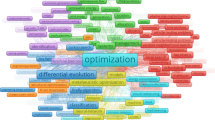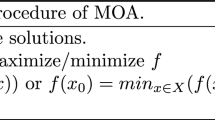Abstract
In this paper we show how to modify a large class of evolution strategies (ES’s) for unconstrained optimization to rigorously achieve a form of global convergence, meaning convergence to stationary points independently of the starting point. The type of ES under consideration recombines the parent points by means of a weighted sum, around which the offspring points are computed by random generation. One relevant instance of such an ES is covariance matrix adaptation ES (CMA-ES). The modifications consist essentially of the reduction of the size of the steps whenever a sufficient decrease condition on the function values is not verified. When such a condition is satisfied, the step size can be reset to the step size maintained by the ES’s themselves, as long as this latter one is sufficiently large. We suggest a number of ways of imposing sufficient decrease for which global convergence holds under reasonable assumptions (in particular density of certain limit directions in the unit sphere). Given a limited budget of function evaluations, our numerical experiments have shown that the modified CMA-ES is capable of further progress in function values. Moreover, we have observed that such an improvement in efficiency comes without weakening significantly the performance of the underlying method in the presence of several local minimizers.














Similar content being viewed by others
References
Abramson, M.A., Audet, C., Couture, G., Dennis J.E., Jr, Le Digabel, S., Tribes, C.: The NOMAD Project. Software. http://www.gerad.ca/nomad
Audet, C., Le Digabel, S., Tribes, C.: NOMAD user guide. Technical Report G-2009-37, Les cahiers du GERAD (2009)
Audet, C., Dennis, J.E. Jr.: Analysis of generalized pattern searches. SIAM J. Optim. 13, 889–903 (2002)
Audet, C., Dennis, J.E. Jr.: Mesh adaptive direct search algorithms for constrained optimization. SIAM J. Optim. 17, 188–217 (2006)
Auger, A.: Convergence results for the (1, lambda)-SA-ES using the theory of phi-irreducible Markov chains. Theoret. Comput. Sci. 334, 35–69 (2005)
Beyer, H.-G., Schwefel, H.-P.: Evolution strategies: a comprehensive introduction. Nat. Comput. 1, 3–52 (2002)
Booker, A.J., Dennis, J.E. Jr., Frank, P.D., Serafini, D.B., Torczon, V., Trosset, M.W.: A rigorous framework for optimization of expensive functions by surrogates. Struct. Multidiscip. Optim. 17, 1–13 (1998)
Clarke, F.H.: Optimization and Nonsmooth Analysis. Wiley, New York (1983). Reissued by SIAM, Philadelphia (1990)
Conn, A.R., Scheinberg, K., Vicente, L.N.: Introduction to Derivative-Free Optimization. MPS-SIAM Series on Optimization. SIAM, Philadelphia (2009)
Coope, I.D., Price, C.J.: Frame based methods for unconstrained optimization. J. Optim. Theory Appl. 107, 261–274 (2000)
Custódio, A.L., Rocha, H., Vicente, L.N.: Incorporating minimum Frobenius norm models in direct search. Comput. Optim. Appl. 46, 265–278 (2010)
Dolan, E.D., Moré, J.J.: Benchmarking optimization software with performance profiles. Math. Program. 91, 201–213 (2002)
Dolan, E.D., Moré, J.J., Munson, T.S.: Optimality measures for performance profiles. SIAM J. Optim. 16, 891–909 (2006)
Gould, N.I.M., Orban, D., Toint, P.L.: CUTEr, a constrained and unconstrained testing environment, revisited. ACM Trans. Math. Softw. 29, 373–394 (2003)
Greenwood, G.W., Zhu, Q.J.: Convergence in evolutionary programs with self-adaptation. Evol. Comput. 9, 57–147 (2001)
Hansen, N.: The CMA Evolution Strategy: A Tutorial. (June 28 2011)
Hansen, N., Arnold, D.V., Auger, A.: Evolution strategies. In: Kacprzyk, J., Pedrycz, W. (eds.) Handbook of Computational Intelligence. Springer, Berlin (2014, to appear)
Hansen, N., Fincky, S., Rosz, R., Auger, A.: Real-Parameter Black-Box Optimization Benchmarking 2010: Noisy Functions Definitions. Technical report (March 22 2010)
Hansen, N., Fincky, S., Rosz, R., Auger, A.: Real-Parameter Black-Box Optimization Benchmarking 2010: Noiseless Functions Definitions. Technical report (September 28 2010)
Hansen, N., Ostermeier, A.: Adapting arbitrary normal mutation distributions in evolution strategies: the covariance matrix adaptation. In: Proceedings of the 1996 IEEE International Conference on Evolutionary Computation, pp. 312–317 (1996)
Hansen, N., Ostermeier, A., Gawelczyk, A.: On the adaptation of arbitrary normal mutation distributions in evolution strategies: the generating set adaptation. In: Eshelman, L. (ed.) Proceedings of the Sixth International Conference on Genetic Algorithms, pp. 57–64, Pittsburgh (1995)
Jägersküpper, J.: How the (1+1)-ES using isotropic mutations minimizes positive definite quadratic forms. Theor. Comput. Sci. 361, 38–56 (2006)
Jägersküpper, J.: Probabilistic runtime analysis of (1+1)-ES using isotropic mutations. In: Proceedings of the 8th Annual Conference on Genetic and Evolutionary Computation, GECCO ’06, pp. 461–468. ACM, New York, NY, USA (2006)
Kolda, T.G., Lewis, R.M., Torczon, V.: Optimization by direct search: new perspectives on some classical and modern methods. SIAM Rev. 45, 385–482 (2003)
Le Digabel, S.: Algorithm 909: NOMAD: nonlinear optimization with the MADS algorithm. ACM Trans. Math. Softw. 37, 1–15 (2011)
Moré, J.J., Wild, S.M.: Benchmarking derivative-free optimization algorithms. SIAM J. Optim. 20, 172–191 (2009)
Rechenberg, I.: Evolutionsstrategie: Optimierung Technischer Systeme nach Prinzipien der Biologischen Evolution. Frommann-Holzboog (1973)
Rios, L.M., Sahinidis, N.V.: Derivative-free optimization: a review of algorithms and comparison of software implementations. J. Glob. Optim. 56, 1247–1293 (2013)
Vicente, L.N., Custódio, A.L.: Analysis of direct searches for discontinuous functions. Math. Program. 133, 299–325 (2012)
Acknowledgments
We would like to thank three anonymous referees, the associate editor, and the co-editor (Sven Leyffer) for their comments which improved the presentation of the paper.
Author information
Authors and Affiliations
Corresponding author
Additional information
Y. Diouane: Support for this author has been provided by Depth Imaging and High Performance Computing TOTAL Exploration & Production, Avenue Larribau, 64018 Pau, France (PI Dr. Henri Calandra).
L. N. Vicente: Support for this author was provided by FCT under grant PTDC/MAT/098214/2008 and by the Réseau Thématique de Recherche Avancée, Fondation de Coopération Sciences et Technologies pour l’Aéronautique et l’Espace, under the grant ADTAO.
Rights and permissions
About this article
Cite this article
Diouane, Y., Gratton, S. & Vicente, L.N. Globally convergent evolution strategies. Math. Program. 152, 467–490 (2015). https://doi.org/10.1007/s10107-014-0793-x
Received:
Accepted:
Published:
Issue Date:
DOI: https://doi.org/10.1007/s10107-014-0793-x




